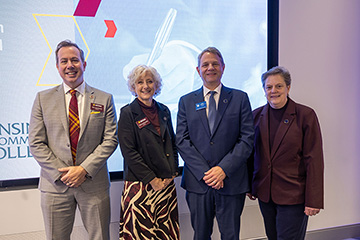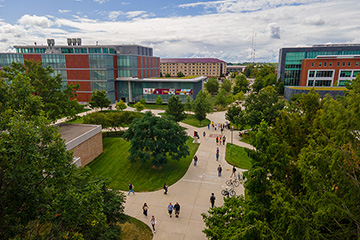CMU invests in future enrollment
Enhanced admissions, retention efforts aim to reach new goals for 2020
Central Michigan University's preliminary fall 2019 student enrollment decreased as expected, yet enhanced efforts in admissions and recruitment efforts aim to turn enrollment around.
"We are seeing a continuation of the downward trend affecting most public universities in Michigan and across the country," said CMU President Bob Davies. "This is certainly something we predicted and prepared for in our budget and operational planning. We are making major investments in key areas and implementing new strategies to turn our enrollment trend around."
Many reasons contribute to this national trend, but the major drivers are shrinking high school populations, a substantial increase in competition for students, a decline in community college enrollment and a continued strong U.S. job market that has many potential university students postponing entering a four-year college or university.
"We have set aggressive enrollment goals for the years ahead, but as these smaller class sizes move through to graduation, recovery from this decline will realistically take four to five years," Davies said.
This recovery, however, is becoming reality as CMU already is seeing a significant increase in applications for fall 2020, compared to fall 2019.
While final fall 2019 numbers are not available until January, CMU's preliminary numbers estimate:
- Total enrollment: 19,210 — a year-over-year decrease of 11%.
- New freshman enrollment: 2,517 — slightly above the university's goal of 2,500 but a decrease of 242 from the 2018-2019 academic year.
- New transfer enrollment: 966 — down 97 students from 1,063 last year.
- First-to-second year retention decreased from 78% in 2018 to 74% this fall.
Investing in change
This spring, Davies communicated with the campus community about Central's enrollment challenges, highlighting a vision for change.
At the heart of this vision are major investments in recruitment and retention efforts.
Most notably, he highlighted a renewed focus on recruiting in metropolitan Detroit and Grand Rapids; growing Central's reach and relevance in Indiana, Illinois, Ohio and Wisconsin; increasing international recruitment and enrollment; and leveraging Central's position as a leader in online and distance education programs.
Investments in admissions also include adding new staff focused specifically on community college relations, transfer services and out-of-state recruitment efforts.
To address declining retention, Central has invested heavily in programs such as advising, counseling, student success coaches and student health services.
"We are doing more to promote support services around campus and to ensure students know where to go when they need help," Davies said in a report to the Board of Trustees in September. "We must empower students to play an active role in their academic journey while also strengthening the support we offer along the way — a true partnership for student success."
In addition, Central's academic advising will become mandatory for all students. All new first-year students must complete at least two meetings with their assigned academic advisor each year and will receive more frequent digital check-ins.
"These investments will help us change the trajectory of our enrollment trends while continuing our focus on student success," Davies said.



